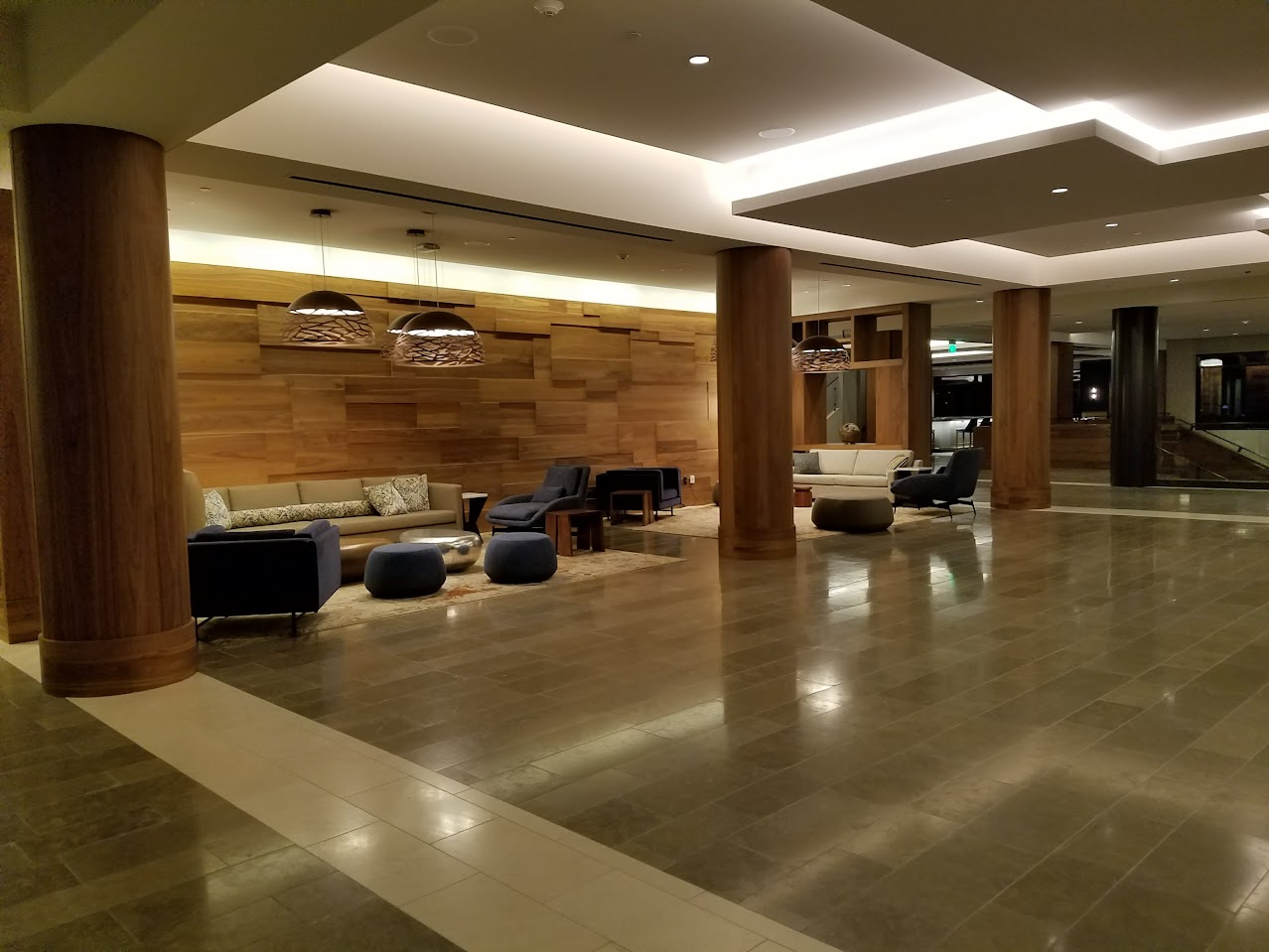The Hyatt Regency Lake Washington in Renton, by Boeing’s factory, was financed in part by loans from Chinese citizens seeking EB-5 visas.

Boeing Factory From The Hyatt Regency Lake Washington
A total of 199 EB-5 investors each put in $500,000 for $99.5 million, and also paid a $50,000 administration fee. 49 of the investors are suing for their full $550,000, even though it appears their claim may receive some payout and even though they got what they were actually after which was a cheap way to purchase U.S. citizenship (the price wasn’t raised to its current level until 2022).
The EB-5 visa program, officially the Immigrant Investor Program, allows foreign investors to obtain a U.S. green card (permanent residency).
- It takes a standard investment of $1,050,000 currently ($800,000 in targeted areas – rural or with high unemployment).
- The investment has to ‘create or preserve’ at least 10 full-time jobs for U.S. workers within two years of admission to the U.S. and the investment has to be fully at-risk, with no guarantee of return.
- This provides a path to U.S. citizenship after 5 years, spouse and children can benefit, and no family or employer sponsor is needed.
In general, processing takes 2-4 years with faster processing for rural projects. However, since no more than 7% of each year’s EB-5 visas can go to nationals of a single country (unless the full allotment for the year is not taken), China faces long backlogs due to oversubscription.
At this point it reportedly can take over 10 years for new applicants from China to get approved. Wealthy Chinese nationals want out!

Hyatt Regency Lake Washington
The property suffered during the pandemic. It’s part of a larger mixed-use development project with empty office towers that would have supported room nights at the hotel. Boeing has struggled and the hotel relied heavily on business travel there for transient business. It wound up in bankruptcy.

Boeing Factory From The Hyatt Regency Lake Washington
The hotel was sold out of bankruptcy for $103 million, or $296,830 per key.
That doesn’t cover the $147 million in debts attributable to the property, and the EB-5 investors were subordinate to other lenders – which they say wasn’t properly or fully disclosed so they’ve been suing the developer. (They claim that only $19 million could be borrowed with greater priority than their investment, not the $130 million ultimately borrowed.)
The suit claims the hotel should have cost “between $43 million and $105 million” to build, not the $250 million total raised for the project. While I’m not an expert in hotel construction costs, an average full service hotel now costs $400,000 per room to build though this hotel would likely trend higher due to land costs (relatively high in King County, though lower than downtown Seattle); labor costs (Seattle-area rates trend above national averages); and that it features quite high-end furniture, fixtures, and equipment.

Hyatt Regency Lake Washington
It’s not going to hit the $1 million per room it might cost to build true luxury in an expensive downtown, and while the ultimate cost to deliver the hotel may have been high and higher than expected it doesn’t seem on-face shocking either.
Ultimately there’s a lot of gaming of the U.S. immigration system because it’s overly cumbersome and complex (creating the opportunity to game) and desire to come here vastly outstrips the number of legal slots available. There are developers, employment brokers, and attorneys whose industry it is to take those limited slots and steer them.
There’s no better place to come be an entrepreneur or scientist. There’s no better place to secure wealth, although maybe a bunker in New Zealand is a second option (but if it comes to that, the people you’ve hired to protect you seem likely to turn on you when dollar-denominated wealth carries much less sway). We’re far enough away from China’s sphere of influence and Russia’s, and that makes the U.S. a great hedge.
We should want the best and brightest, and even want them more than the median person who holds citizenship today due to accident of birth. A $500,000 or $1 million loan for a hotel project though? That’s too cheap! It’s just a recipe for someone else’s grift to take some of the surplus from that transaction. But suing because that loan goes bad? Maybe they’ve become true Americans after all! Though it clearly misses the point of what they were buying in the first place.
By the way here’s what a Republican debate on immigration used to look like.


In neither bankruptcy, nor commercial real estate, nor immigration law am I an expert, so I’ll refrain from substantive comments. Will any subsequent commenters exhibit the same level of dignity as me? Assuredly not. The only experts in the above mentioned fields are charging clients well into the 4 figures per hour for legal work and are not commenting on View from the Wing.
And, ever since it got sold out of bankruptcy, the hotel’s level of service and cleanliness have declined precipitously.
I still don’t understand the logically reasoning for not having a ban on EB-5’s for nationals of countries of concern. This includes PRC, Russia, Iran, DPRK, Cuba, Belarus, Syria, etc.
Gary, I agree with your nuanced take on this topic, specifically, and the unfortunate reality of the gaming of the US immigration system, generally.
Now, surely, the usual folks are about to barrel in here and spread hate and xenophobia. *gong*
Citizenship for sale? Why isnt this news on major networks. Whoever approved this should be horsewhipped.
many western countries allow some sort of accelerated residency or citizenship for high value investors so this in program in principles is not unusual. As Gary notes, the amount might not be high enough.
Since the government manages citizenship but private enterprise manages how the investment is used (even if the feds are involved in chapter 11 bankruptcy filings) it is doubtful that there is a legal argument that the investors should get back what they put in or that their citizenship should be amended because of the failed investment.
Anyone with that kind of money to burn in China is probably part of the Communist government apparatus and not someone we’d want anyway.
The EB-5 program not only *requires* U.S. job creation as a prerequisite to qualifying for U.S. permanent residency, it also brings wealthy families and their substantial capital into the United States on a permanent basis. That was the purpose of the program’s creation, and that’s exactly what it has done. For every less-than-successful project like this one, there are a multitude of successful projects that have benefitted everyone involved – the foreign national investors, the project developers, and the communities in which the projects are located. Focusing only on these “bad apple” projects (and they do exist) ignores the ample benefits that far outweigh the problems. In fact, just look at Vancouver, Canada for an example of how immigrant investment can be a boon. In the 1990s, the U.S. was very restrictive with wealthy Hong Kongers wanting to get out with their money before China took over. Canada was not. The Hong Kongers took their money to Vancouver and both revitalized the city and transformed its skyline. The U.S. missed out on all that investment due to an overly-restrictive immigration system. Furthermore, all EB-5 investors are vetted from a security perspective (for those worried that they’re really part of the Chinese government), and each investor has to prove to the U.S. government, with evidence, that their invested funds come from “clean” sources. It’s a good and beneficial program.
Very interesting article. The usual wait time of 2-4 years assumes that the EB-5 applications are processed via traditional channels; who knows how many USCIS employees are conducting immigration business via their personal devices (like, say, the entire incoming administration).
Also, a number of applicants work around the 7% rule by obtaining a golden visa from EMEA first.
The location of this hotel makes it an albatross. The demographics and business in this location simply doesn’t support a 4-star hotel.
I wouldn’t be surprised if the developers did just fine if they paid themselves management and acquisition fees and other fees from the investors. I would expect that the documents for the investors disclosed all the risks. Maybe there are some insurers that will pay enough to make it worth it to the lawyers but the investors are probably screwed if they expected a return.
In the long run I don’t see how this property stays a Hyatt Regency. Weekend weddings and the occasional business traveler aren’t enough to support the property.
We really do have a broken immigration process in USA. Creates too many opportunities for scams. H1B when the employer sponsors is a decent program. We should invite students who successfully complete college education to stay and work.
Beyond that… It’s sad that even Indians and Chinese come via the Mexico border because it’s pragmatically the only cost-effective way to immigrate.
I had dinner recently with an acquaintance who ended up being involved in a “golden passport” scene. With the developments in the past few years, that person was reassigned to “de-naturalization”. It turns out that the some of the Russians who bought passports were on the Ukraine sanctions list, and some of the Chinese were gangsters.
I’m sorry to see that a project to bring investment capital would create such unhappiness for everybody involved.
@Marine Tern what a reasonable analysis (so, of course, what is it doing here?). If one was only motivated by benefit to the US, we’d let the best STEM foreign-born college graduates stay and would encourage successful entrepreneurs to come on over. N.B. This does not imply I would give access to no non-educated, non-sucessful immigrant applicants.
My wife’s parents immigrated through the same program. I explained the program to them by saying that these “loans” or “investments” were made into businesses that clearly did not qualify for traditional loans from banks or other financial institutions. While that may not have been entirely accurate, it helped them understand that there was a significant risk involved. Interestingly, one of the properties they inquired about was a ski resort in the upper northeast, which my research revealed had gone bankrupt multiple times. They instead invested in a property in Tampa that was devastated during one of the hurricanes. I was VERY surprised when I was told that they got their money back with interest. What are your thoughts?
Jesse said it best and with the shortest comment. These investors have FU money and nobody accumulates that type of money without CCP connections and possibly doing unscrupulous activities in China. We don’t need these people turning Seattle into Vancouver where rich kids of CCP beneficiaries drive around in AMG Benzes acting foolish.